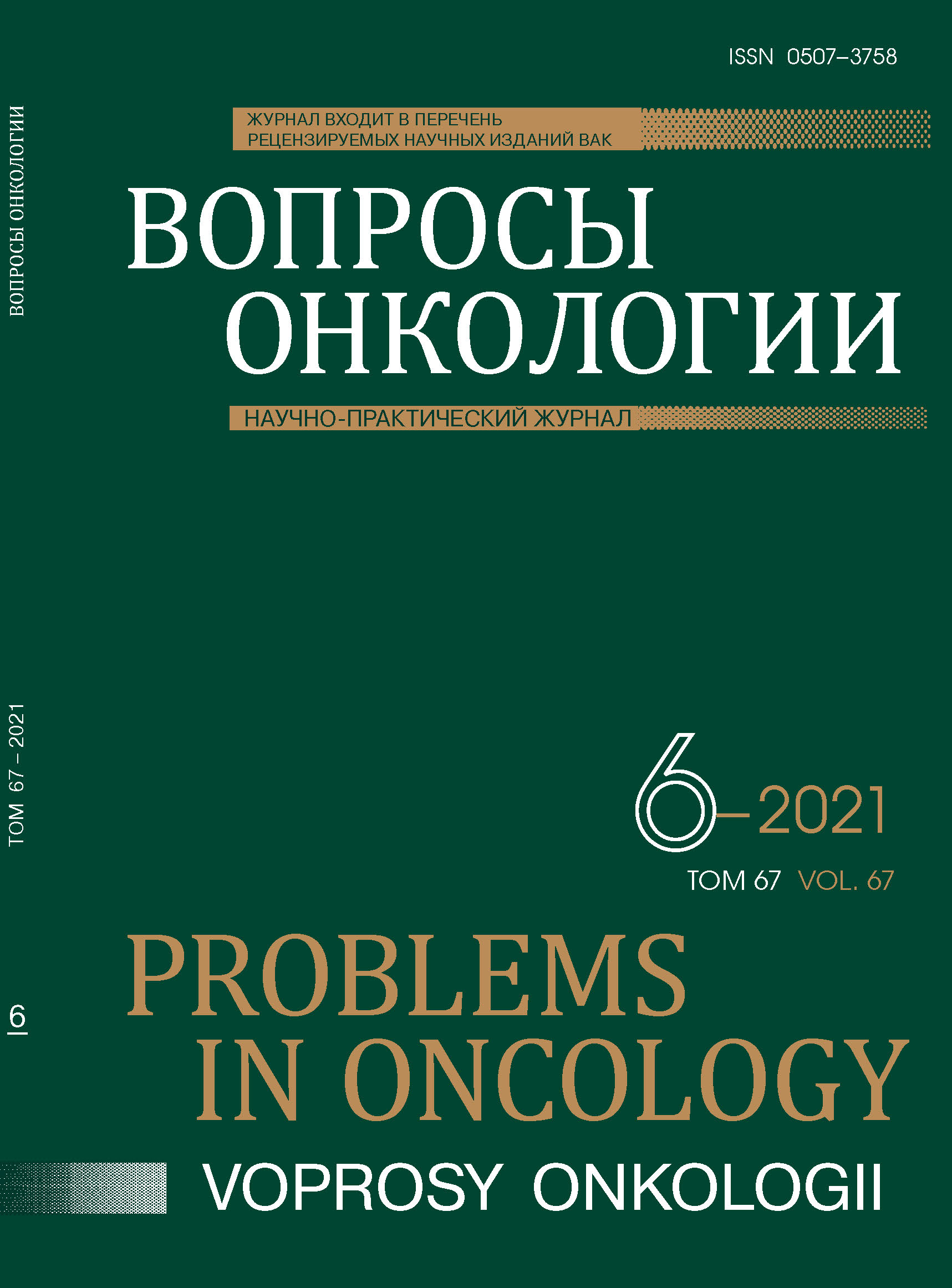Abstract
Purpose. To study the influence of PD-L1 expression on the dynamics of immunological changes before and at different intervals after stereotactic body radiation therapy (SBRT) of metastatic lesions in patients with metastatic forms of solid tumors.
Materials and methods. A quantitative assessment and analysis of blood immunological parameters was conducted before irradiation, via 3-4 weeks and via 6-8 weeks after SBRT in patients with malignant tumors with oligometastases in the liver or lungs, in groups with negative and positive expression of PD-L1. All peripheral blood samples were analyzed by flow cytometry. Statistical analysis was performed using Friedman and Nemenyi criteria.
Results. 3-4 weeks after the end of SBRT in group CPS <1 we observed statistically significant increase of activated T-helpers (CD3+CD4+HLA-DR+), activated cytotoxic T-lymphocytes (CD3+СD8+HLA-DR+), T-lymphocytes (CD3+CD19-) and T-helpers (CD3+CD4+). Wherein, activated T-helpers and activated cytotoxic T-lymphocytes statistically significantly increased 6-8 weeks after SBRT compared with the study before irradiation. In group CPS> 1, we revealed statistically significant increase of activated T-helpers 6-8 weeks after and decrease of T-regulatory lymphocytes (CD4+CD25brightCD127low) 3-4 weeks after completion of SBRT compared with the study before radiotherapy. When we analyzed the indicators by the TPS index, most of the statistically significant changes were recorded in the group with negative expression (TPS <1): increasing of activated T-helpers and activated cytotoxic T-lymphocytes 3-4 weeks and 6-8 weeks after SBRT and decreasing of T-regulatory lymphocytes 3-4 weeks after irradiation compared with the study before irradiation.
Conclusion. Groups with negative PD-L1 expression (CPS <1 and TPS <1) are associated with a more activated antitumor T-cell immune response compared to patients with positive PD-L1 status (CPS≥1 and TPS≥1), however, further researches are needed.
References
Зозуля А.Ю., Балдуева И.А., Новиков С.Н. Иммунологические эффекты стереотаксической лучевой терапии при злокачественных новообразованиях различных локализаций: обзор литературы // Сибирский онкологический журнал. 2020;19(5):108–113.
Зозуля А.Ю., Новиков С.Н., Балдуева И.А. и др. Изменение иммунного статуса у пациентов с метастатическими формами солидных опухолей на фоне стереотаксической лучевой терапии // Вопросы онкологии. 2020;66(3):277–282.
Baumeister SH, Freeman GJ, Dranoff G et al. Coinhibitory Pathways in Immunotherapy for Cancer. // Annu Rev Immunol. 2016;34:539–73.
Breen WG, Leventakos K, Dong H, Merrell KW. Radiation and immunotherapy: emerging mechanisms of synergy // J Thorac Dis. 2020;12(11):7011–7023. doi:10.21037/jtd-2019-cptn-07. PMID:33282406; PMCID:PMC7711365
Friedman M. A comparison of alternative tests of significance for the problem of m rankings // The Annals of Mathematical Statistics. 1940;11(1):86–92.
Ghatalia P, Zibelman M, Geynisman DM, Plimack ER. Checkpoint Inhibitors for the Treatment of Renal Cell Carcinoma // Curr Treat Options Oncol. 2017;18(1):7. doi:10.1007/s11864-017-0458-0. PMID: 28210995
Liu X, Yao J, Song L et al. Local and abscopal responses in advanced intrahepatic cholangiocarcinoma with low TMB, MSS, pMMR and negative PD-L1 expression following combined therapy of SBRT with PD-1 blockade // J Immunother Cancer. 2019;7(1):204. doi:10.1186/s40425-019-0692-z
Mahoney KM, Freeman GJ, McDermott DF. The Next Immune-Checkpoint Inhibitors: PD-1/PD-L1 Blockade in Melanoma // Clin Ther. 2015;37(4):764–82. doi:10.1016/j.clinthera.2015.02.018. Epub 2015 Mar 29. PMID: 25823918; PMCID: PMC4497957
Nemenyi P. Distribution-free Multiple Comparisons. Ph.D. thesis, Princeton University, 1963.
Theelen W, Peulen H, Lalezari F et al. Randomized phase II study of pembrolizumab after stereotactic body radiotherapy (SBRT) versus pembrolizumab alone in patients with advanced non-small cell lung cancer: the PEMBRO-RT study // J Clin Oncol 2018;36:9023.
Trujillo JA, Sweis RF, Bao R, Luke JJ. T cell-inflamed versus non-T cell-inflamed tumors: a conceptual framework for cancer immunotherapy drug development and combination therapy selection. // Cancer Immunol Res. 2018;6:990–1000. doi:10.1158/2326-6066.CIR-18-0277
Xia L, Liu Y, Wang Y. PD-1/PD-L1 Blockade Therapy in Advanced Non-Small-Cell Lung Cancer: Current Status and Future Directions // Oncologist. 2019;24(Suppl. 1):S31–S41. doi:10.1634/theoncologist.2019-IO-S1-s05. PMID: 30819829; PMCID: PMC6394772
Xing D, Siva S, Hanna GG. The abscopal effect of stereotactic radiotherapy and immunotherapy: fool’s gold or el dorado? // Clin Oncol (R Coll Radiol). 2019;31(7):432–443. doi:10.1016/j.clon.2019.04.006
Yi M, Jiao D, Xu H et al. Biomarkers for predicting efficacy of PD-1/PD-L1 inhibitors // Mol Cancer. 2018;17(1):129. doi:10.1186/s12943-018-0864-3

This work is licensed under a Creative Commons Attribution-NonCommercial-NoDerivatives 4.0 International License.
© АННМО «Вопросы онкологии», Copyright (c) 2021
